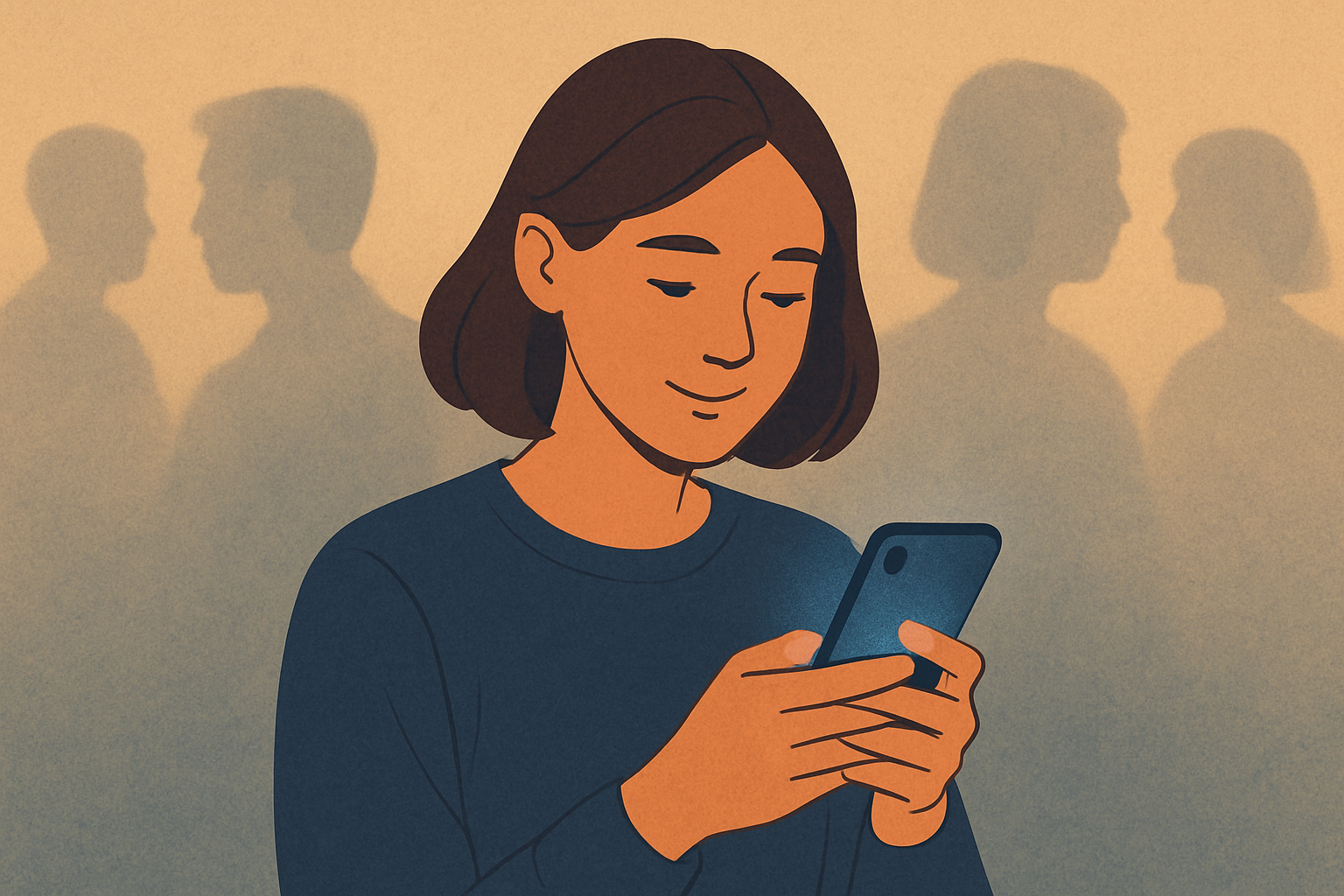Should You Vent to AI Instead of a Friend?

It’s late. You’re overwhelmed. Maybe it’s a breakup, a work crisis, or just that hollow feeling that doesn’t seem to go away. You reach for your phone, not to text a friend, but to open ChatGPT, or an AI companion app. You start typing everything you’re feeling. And surprisingly, it helps.
More and more people are turning to AI for emotional support. Whether it’s ChatGPT, Replika, Aitherapy, or another chatbot trained to respond with empathy, these tools offer something uniquely comforting: 24/7 availability, a judgment-free space, and an instant sense of being heard.
But what really happens when you vent to AI instead of a friend? Is it just a temporary coping mechanism, or is this shaping a new kind of emotional relationship between humans and machines? In this article, we’ll explore the reasons behind this growing trend, the science of AI empathy, the benefits and limitations, and what it means for the future of mental health.
Why Are People Venting to AI?
It’s no longer unusual to hear someone say, “I told ChatGPT everything I couldn’t tell anyone else.” At first, it might sound odd, why would someone choose a machine over a friend? But when we look closer, it starts to make sense.
1. AI Is Always Available
Unlike friends or therapists, AI doesn’t sleep, cancel plans, or ask you to wait. It’s there whenever you need it, at 3 a.m., during a panic attack, or after a long day when you just need to unload. This 24/7 access gives people a sense of emotional control during unpredictable moments.
2. There’s No Fear of Judgment
Even our closest friends can make us feel exposed. There’s the fear of being misunderstood, overreacting, or burdening others. AI feels safe because it doesn't judge. People often report they can be more honest with AI than with humans especially when it comes to shame, guilt, or self-doubt.
3. Loneliness Is Rising
According to the U.S. Surgeon General, loneliness has become a public health crisis. In today’s fast-paced, hyperconnected world, people are paradoxically more isolated than ever. AI offers a form of connection that, while not human, can still feel deeply soothing. In moments of emotional isolation, a chatbot can be a lifeline.
4. Mental Health Support Is Hard to Access
Therapy is expensive. Waitlists are long. In some regions, it’s not available at all. AI tools like Aitherapy are filling that gap by offering low-cost or free support. They may not replace therapy, but they make emotional care more accessible to people who might otherwise get none.
As digital companions become more emotionally intelligent, it’s no wonder people are choosing them for their most vulnerable moments. But what does AI actually do when we open up to it?
How AI Responds When You Open Up
When you tell an AI that you’re sad, anxious, or heartbroken, it often replies with empathy that feels real: “I’m really sorry you’re feeling this way. Want to talk more about it?” For many, this is surprisingly comforting. But what’s really going on when an AI responds like a therapist or friend?
1. AI Isn’t Sentient, But It Can Sound Like It Is
AI tools like ChatGPT or Replika don’t feel empathy they simulate it. They’re trained on massive datasets, including conversations, emotional language, and even therapeutic dialogues. This helps them generate responses that sound compassionate.
The result? You feel seen. Heard. Understood. And that matters.
2. Language Models Are Surprisingly Good at Emotional Mirroring
AI chatbots are skilled at repeating back emotional language in a validating way. This is called emotional mirroring, a technique real therapists use too. So if you say, “I feel like I’m failing,” the AI might reply, “That sounds incredibly hard. It’s okay to feel overwhelmed.”
This kind of response reduces emotional intensity and helps people feel less alone, even without a human on the other end.
3. Some Are Trained on Therapeutic Frameworks
Apps like Aitherapy are trained on cognitive behavioral therapy (CBT) frameworks. That means they don’t just listen, they offer structured ways to reflect on thoughts, identify distortions, and practice self-compassion. Unlike general-purpose chatbots, they’re built specifically to support mental health in evidence-based ways.
4. But There Are Limits
AI can’t truly understand the emotional weight of your experiences. If you say something like “I wish I wasn’t here,” it might respond with generic safety suggestions or tell you to contact a helpline, important, but impersonal.
That’s why it’s essential to use AI as a tool, not a replacement for deep, ongoing human connection or clinical care.
What AI Can Actually Help With
Despite its limitations, venting to AI offers surprising mental health benefits, especially for those who struggle to open up or don’t have consistent support. When used with intention, AI can become a powerful emotional tool.
1. A Safe, Judgment-Free Space to Be Honest
People often find it easier to be vulnerable with AI than with friends or even therapists. There’s no risk of being interrupted, misunderstood, or judged. You can say exactly what you’re feeling, raw, unfiltered, and the AI will simply respond with calm, supportive language.
For many, this creates an emotional safety net: a place to get thoughts out without fear.
2. Emotional Regulation Through Reflection
Journaling has long been shown to reduce anxiety and improve clarity. AI brings this practice to life in an interactive way. When you write to an AI companion, it mirrors your emotions back to you, helping you slow down, observe your thoughts, and feel more in control.
Tools like Aitherapy, which incorporate cognitive behavioral techniques, can even guide you through reframing negative thoughts, recognizing distortions, and identifying patterns.

3. Accessible Mental Health Support for All
AI doesn’t require insurance. It’s available 24/7. And it doesn’t have a waiting list. This makes it incredibly valuable for people in underserved areas, those who can’t afford therapy, or anyone needing instant emotional support in the moment.
4. A Bridge to Human Therapy
For people nervous about starting therapy or unsure whether they need it AI can serve as a low-pressure starting point. It helps users practice putting feelings into words, explore emotional topics, and even realize they want deeper support from a human therapist.
One Aitherapy user wrote: “I never felt ready for real therapy. But after a few weeks of using the AI, I realized I had more to say than I thought. It gave me the push I needed.”
5. Consistency and Privacy
AI never gets tired. You can vent ten times a day or return after weeks of silence, and it’ll still respond gently. For those with inconsistent support systems or privacy concerns, that reliability is a quiet kind of comfort.
The Limits and Risks of Replacing Real Friends
Venting to AI can feel safe, helpful, even healing but it’s not a perfect substitute for human connection. As AI companions become more emotionally responsive, it’s important to remember what they can’t offer.
1. No Real Empathy or Lived Experience
AI doesn’t feel. It doesn’t have emotions, history, or context. While it may say, “I understand,” what it really means is, “This is a statistically likely next sentence.” That lack of lived experience limits how deeply it can truly connect with or comfort someone in crisis.
Even if the words feel right, something is missing the unspoken comfort of being truly known by another person.
2. Emotional Avoidance
If you always turn to a chatbot instead of a friend, partner, or therapist, you might be avoiding emotional vulnerability with real people. This can prevent personal growth and reinforce isolation.
Over time, it may become easier to type into a screen than to practice real-world emotional skills like empathy, conflict resolution, or asking for help.
3. No Lasting Relationship or Memory
Most general-purpose AIs like ChatGPT don’t remember past conversations unless memory is explicitly turned on and even then, it’s limited. You can pour your heart out today, and tomorrow it will respond like a stranger. That lack of continuity can create an illusion of connection without the depth that real friendships provide.
4. Potential for Misinformation or Inappropriate Responses
Although AI has improved, it’s not perfect. It might misinterpret your emotional tone, give overly generic advice, or in rare cases, even respond inappropriately. In high-stakes emotional situations, that can be harmful.
5. Privacy and Data Concerns
Your emotional data isn’t always entirely private. Chat logs can be reviewed to improve AI models or train future systems. Unless you're using a platform with clear privacy safeguards like Aitherapy, which is HIPAA-aligned it’s worth asking: Where does your pain go after you hit “send”?

Real Stories of People Opening Up to AI Before a Human
For many, AI isn’t just a novelty, it’s their first real step toward emotional expression. Whether due to shame, fear, or lack of access, people often find it easier to open up to a chatbot than to another person.
1. “I Said Things to AI I Couldn’t Say to Anyone”
On Reddit, hundreds of users have shared how they confided in ChatGPT, Replika, or Aitherapy during moments of emotional crisis. One user wrote:
“I started typing about my breakup to ChatGPT. I didn’t expect much, but it replied in a way that made me cry. It said the right things. It didn’t fix anything, but it helped me breathe.”
These moments might not lead to resolution but they often break the emotional silence. And that’s powerful.
2. A Bridge to Getting Help
In multiple user interviews and online forums, people say AI helped them practice articulating their emotions, which eventually led to seeking therapy. AI acted as a warm-up a safe place to try putting feelings into words.
This is especially true for men, teens, or people from cultures where mental health stigma runs deep. AI feels neutral, silent, and anonymous. It doesn’t interrupt, judge, or suggest you’re being too sensitive.
3. Research Is Beginning to Back This Up
While this space is still emerging, early studies show that mental health chatbots can reduce anxiety and depressive symptoms. A Stanford study on Woebot, a CBT-based chatbot, found that users experienced a significant reduction in depressive symptoms after just two weeks of use.
As the research grows, so does the case for AI as a meaningful, if limited, emotional support tool.
Should You Vent to AI?
Venting to an AI like ChatGPT or Aitherapy can feel like a lifeline especially when you’re alone, overwhelmed, or unsure who to turn to. And the truth is, it can help.
AI offers a space that’s private, always available, and surprisingly compassionate. It can help you process feelings, reflect on your thoughts, and even build the confidence to open up in real life. For many, it’s not a replacement, it’s a starting point.
But it’s also important to remember what AI isn’t. It’s not a human. It doesn’t form lasting relationships. It doesn’t truly know you. And if you rely on it too much, it can unintentionally deepen your isolation from real friends and support systems.
Use AI as a Tool, Not a Substitute.
Think of AI like a journal that talks back. It can help you feel heard but it can’t hug you, call you on your birthday, or sit with you in silence when you’re hurting.
The healthiest approach? Use AI alongside human connection. Let it be the bridge, not the destination.
Ready to experience a gentle, CBT-trained AI designed to support your emotional growth?
Try Aitherapy for free today, your safe space is just a message away.





